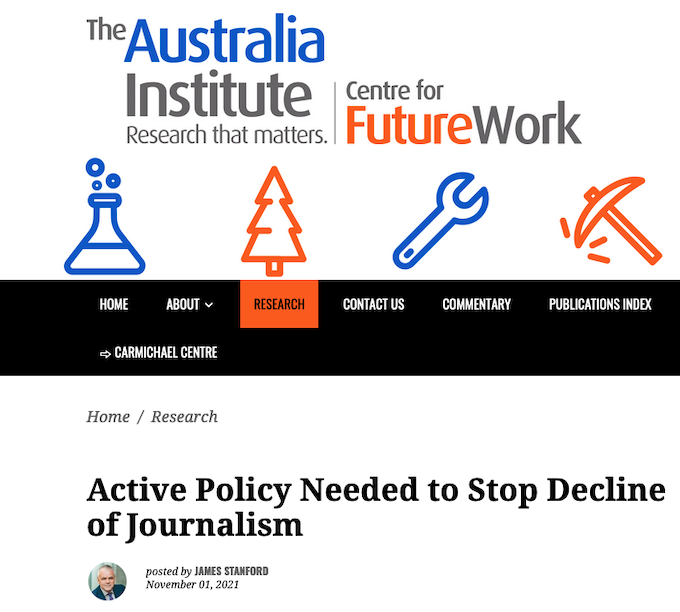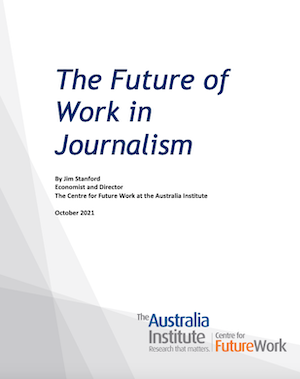
Pacific Media Watch newsdesk
Australia’s union for journalists says Australian journalism is in crisis after years of disruption, undermining and neglect, and swift action is needed to halt the decline.
A new study pointing to the crisis in public interest journalism demands urgent government action to safeguard democracy.
The Media, Entertainment and Arts Alliance (MEAA) commissioned the Centre for Future Work at The Australia Institute to prepare the report, The Future of Work in Journalism, to examine the state of Australian journalism and to develop recommendations that could be used to address the serious decline in public interest journalism that has taken place over the past decade.
- READ MORE: Active policy needed to stop decline of Australian journalism
- How NZ’s Public Interest Journalism Fund can help ‘normalise’ diversity (Part 1)
- Perceptions over NZ’s public interest journalism project – saint or sinner? (Part 2)
- NZ’s Public Interest Journalism Fund

The report says journalism is a “public good” that can only be sustained by a dramatic renovation of government supports, including:
• a new $250 million fund to sustain journalism;
• expanded funding for public media organisations;
• rebates (refundable tax credits) for the employment of journalists;
• tax concessions for consumers of news media; and
• a stronger Mandatory News Bargaining Code with dedicated funding for small and new media.
MEAA media federal president Marcus Strom said: “It’s abundantly clear that the slow erosion of Australia’s media industry over many years has taken its toll on public interest journalism.
“As this study shows, failure to take dramatic steps now places our democracy at risk.”
Disappearance of dozens of outlets
He said the crisis was most stark in the disappearance of dozens of outlets and hundreds of jobs from regional, rural and community media in the past few years.
The Australia Institute’s study reveals that the number of journalists has fallen dramatically over the past decade; that decline will continue without effective policy and regulatory changes.
Efforts to support journalism have, to date, been inadequate and poorly targeted.
Media workers have delivered massive productivity gains in an environment of ongoing cost-cutting, but have been “rewarded” by stagnant wages, and ongoing restructuring and shifts into freelance and casual work, which now make up about one-third of the media workforce.
A significant and unacceptable gender pay gap persists above the national industry average.
The report highlights the upheaval caused to the Australian media ecosystem by the arrival and rise of digital platforms.
The government’s response, the News Media and Digital Platforms Bargaining Code, has not achieved the rebalance needed to promote public interest journalism.
Call to disclose Bargaining Code ‘deals’
The report recommends that the deals struck under the code be disclosed and that dedicated funding be provided to the small-to-medium media sector, which has been “treated with contempt” by the major digital players.
Among the other remedies recommended in the report, MEAA supports calls for certainty around and restoration of the funding of public media including the national broadcasters ABC and SBS; and expansion of the government’s existing Public Interest News Gathering programme to include all classes of journalism, including freelancers, and media content production.
The amount of support needed has been estimated at $250 million a year.
“This storm has been coming for many years,” Strom said.
“The media industry has been savaged. Thousands of journalism jobs have been lost. Print and broadcast media have all been hurt: mastheads have closed, networks have been cut back.
“Local community and regional reporting has, in many places, disappeared altogether. The number of media players have been reduced to a handful of very powerful players, and that power concentrated in the hands of a few reduces the variety of voices and choices for Australians.
‘Cynically avoided regulation’
“The News Media Bargaining Code offers a partial remedy to the revenue losses by Australian media, but the big digital platforms have cynically avoided regulation under the code by promising to do ‘just enough’.
“Outside the code they are showing their ‘just enough’ is wholly inadequate with not only small publishers missing out, but SBS and The Conversation being excluded.
“Public interest journalism is a public good. It informs and entertains Australians, ensures the public’s right to know and holds the powerful to account.
“If we want that to continue, then there is no time to waste to address the many challenges facing those working in journalism and the entire media industry.”
In other media developments today, the video Your ABC vs Their IPA, funded by ABC Alumni and the ABC Friends, was released on YouTube in response to an attack by the rightwing Institute of Public Affairs (IPI) on the ABC. The ABC itself is not involved in any way, but the presenter is former ABC Media Watch presenter Jonathan Holmes who says that “the mainstream thinks that the ABC is the most trustworthy source of news in Australia”.










































